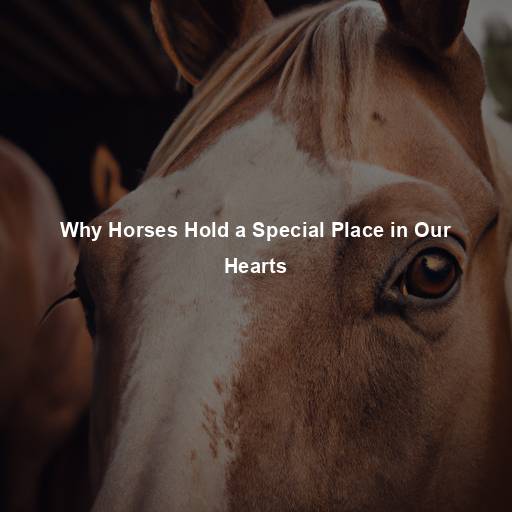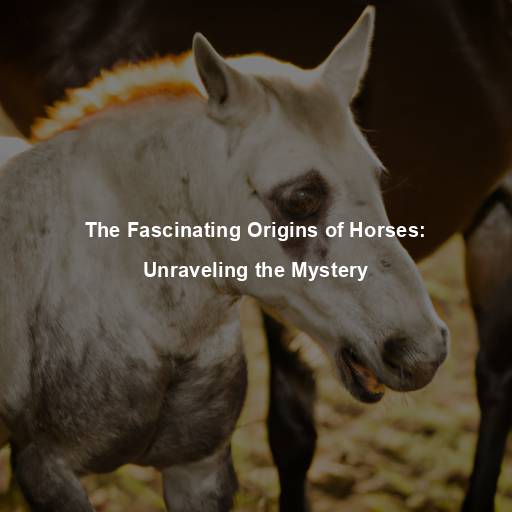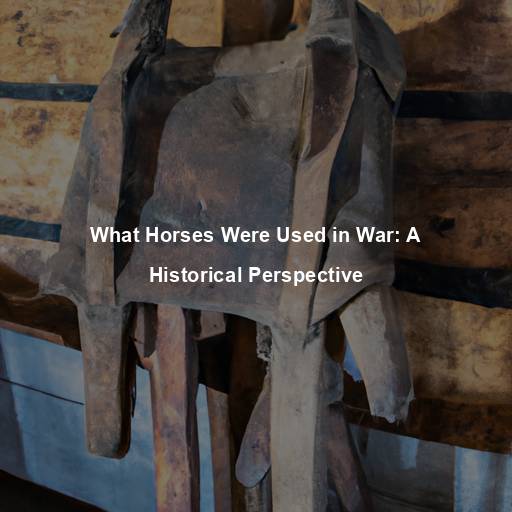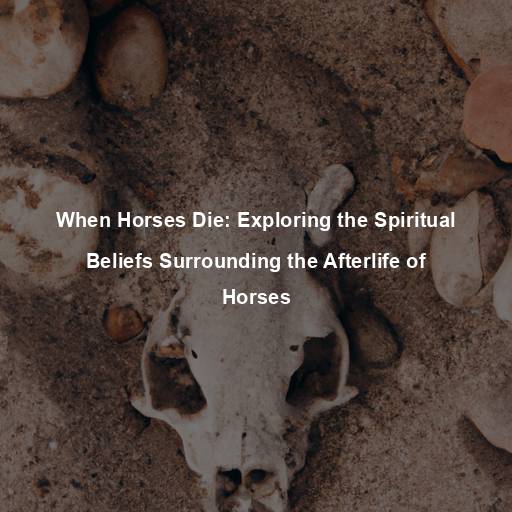Why Horses Hold a Special Place in Our Hearts
Last Updated on November 9, 2023 by Evan
Contents [hide]
- 1 The Majesty and Beauty of Horses
- 2 The Enduring Legacy of Horses
- 3 The Symbolism of Horses in Culture and Mythology
- 4 The Conservation of Horse Breeds and Equestrian Sports
- 5 The Future of Humans and Horses
- 6 The Economic Impact of Horses
- 7 The Role of Horses in Therapy and Rehabilitation
- 8 The Future of Horse-Human Relationships
- 9 FAQs – Why are Horses Important?
- 9.1 What role do horses play in today’s society?
- 9.2 How have horses contributed to transportation throughout history?
- 9.3 Can you explain the importance of horses in agriculture?
- 9.4 How have horses contributed to military efforts over time?
- 9.5 How do horses contribute to therapeutic activities and emotional well-being?
The Majesty and Beauty of Horses
Throughout the ages, horses have ensnared the very essence of our imagination, seducing us with their elegant allure and breathtaking grace. They effortlessly command attention and evoke an inexplicable sense of wonder. Yet, the enigma surrounding their significance in our lives persists.
Harnessing the raw power of a galloping stallion or savoring the tender bond between man and gentle mare, these captivating creatures have undoubtedly earned their esteemed roles in history’s grand tapestry. but what secret lies behind this profound connection that ignites an inexplicable spark within our souls? We embark on an exhilarating journey into the enigmatic realm of horses to unearth the answers we seek.
A Bond That Transcends Time
Horses have always managed to captivate human hearts, their presence signifying much more than just a mere animal. Throughout the course of history, these majestic creatures have evolved from being simply our means of transportation to becoming genuine partners in various aspects of our lives. From maneuvering across expansive terrains to assisting in the laborious tasks of cultivating our fields, horses have tirelessly served us. The undeniable bond between humans and horses has woven a profound connection that transcends both time and cultural barriers, leaving us in awe of their grace and strength.
The Horse-Human Connection
The bond between horses and humans is truly remarkable, with horses displaying an innate understanding and an uncanny ability to communicate with us. These perceptive creatures have the incredible knack for sensing our emotions and intentions, further solidifying their position as one of the most sensitive animals in the world. Through this unique connection, horses form deep emotional bonds with their human counterparts, developing relationships based on trust, respect, and an unparalleled level of understanding. It is through this harmonious partnership that remarkable friendships and lifelong alliances are formed between horses and their owners.
Horses as Therapy Partners
Beyond their physical capabilities, horses have also proven to be invaluable in the realm of therapy and healing. Equine-assisted therapy has gained significant recognition as a powerful tool for individuals with physical, emotional, and cognitive challenges. Interacting with horses can have a profound impact on mental well-being, promoting self-confidence, empathy, and emotional healing. Horses offer a non-judgmental presence and a safe space for individuals to explore their emotions, fostering personal growth and resilience.
Horses as Teachers
Horses have a unique way of teaching us important life lessons. Interacting with these magnificent creatures requires patience, empathy, and clear communication. They teach us the value of trust, as we must earn their respect and establish a strong foundation of mutual understanding. Horses also teach us the importance of being present in the moment, as they respond to our energy and body language.
Horses in Sports and Recreation
Horses have long been a central figure in the world of sports and recreation. Equestrian events such as horse racing, show jumping, and dressage have captivated audiences for centuries. The grace, power, and skill displayed by both horse and rider in these disciplines are a testament to the incredible partnership between humans and horses. Moreover, horseback riding and horse trekking offer individuals a unique opportunity to connect with nature and experience a sense of freedom and adventure.
Preserving Our Equestrian Heritage
As our society continues to evolve, it is crucial to preserve our equestrian heritage and ensure the well-being of horses. Equine welfare should be a top priority, with responsible ownership, proper care, and ethical training practices. Organizations dedicated to horse rescue, rehabilitation, and retirement play a vital role in safeguarding the future of these magnificent animals. By promoting education and awareness, we can ensure that future generations appreciate the beauty and value of horses.
The Enduring Legacy of Horses
In conclusion, horses hold a special place in our hearts due to their majestic beauty, profound connection with humans, therapeutic benefits, and invaluable teachings. They have been our steadfast companions throughout history, serving as partners, teachers, and sources of inspiration. The enduring legacy of horses lies not only in their physical attributes but also in the emotional and spiritual connections they forge with us. As we continue to cherish and protect these extraordinary creatures, we honor the timeless bond between humans and horses.
In an ever-evolving world that propels us forward with breathtaking technology and remarkable advancements, it is astonishing to consider the role of horses in agriculture and industry—a legacy deeply rooted in history and tradition. From the humble beginnings of mankind taming these majestic creatures to the present day, where an array of modern machinery stands mighty, one cannot help but reflect upon the inexplicable bond between man and horse. How did these noble creatures, with their incredible strength and unwavering loyalty, shape the very fabric of our civilization? The intricate dance between horse and human has traversed through time, shedding light on the undeniable impact they have had on our growth as a society.
Powering the Development of Civilization
Throughout history, horses have played a pivotal role in agriculture and industry, contributing to the development and progress of civilizations. Before the advent of machinery, horses were instrumental in plowing fields, pulling carts, and transporting goods. Their immense strength and endurance allowed humans to cultivate crops on a larger scale, leading to increased food production and economic growth. In the industrial era, horses powered early forms of transportation, such as stagecoaches and wagons, enabling trade and commerce to flourish.
The Transition to Modern Machinery
In the ever-evolving world of technology, our equine companions have experienced a remarkable transformation in their involvement within the realms of agriculture and industry. As the clattering of tractors and the roaring of trucks now dominate the fields, horses find themselves in a state of perplexity, grappling with a shifting landscape. Yet, amidst this tumultuous change, it appears that these majestic creatures still possess an irrevocable allure, stubbornly holding on to their relevance in select sectors. In the enchanting world of organic farming or the delicate intricacies of vineyard management, horses gallantly reign supreme, effortlessly maneuvering through labyrinthine paths and subtly guarding against the perils of soil compaction.
Equine-Assisted Activities in Therapy and Education
In an ever-evolving world, horses have transcended their traditional roles and found a place of profound significance. Their impact extends far beyond the physical realm, as they have become essential partners in therapeutic and educational programs. Through equine-assisted activities, like therapeutic riding and hippotherapy, these majestic creatures have demonstrated astonishing efficacy in enriching the lives of individuals with disabilities or special needs. The rhythmic motion experienced while riding a horse not only nurtures balance, coordination, and muscle strength but also weaves a profound emotional tapestry, fostering a bond that enhances overall well-being and spurs social interaction.
The Symbolism of Horses in Culture and Mythology
Mythical Creatures and Divine Companions
Throughout the annals of history, horses have captivated the imaginations of mankind, weaving themselves into the tapestry of countless cultures. Their enigmatic presence, often enveloped in mythical lore, serves as a testament to their indomitable power, untamed freedom, and ethereal bond with the spiritual realms. From the revered Pegasus, whose majestic wings bore the mighty thunderbolts of Zeus in Greek mythology, to the legendary Sleipnir, Odin’s enigmatic eight-legged steed in Norse mythology, horses have left an indelible mark on our collective consciousness. Far from being mere relics of ancient tales, these magnificent creatures continue to ignite the flames of inspiration that flicker within the realms of art, literature, and contemporary popular culture.
Horses in Symbolic Art and Literature
Across the annals of time, the splendid equines have artistically galloped their way into the realms of art and literature, captivating the hearts of those who behold them. In the realm of statuesque equestrian tributes, they honor the valiant warriors who have shaped history with their presence. Cherished paintings, too, effortlessly capture the essence of these magnificent creatures, revealing their untamed allure amidst the embrace of nature’s grandeur. Unveiling their profound symbolism, the written word breathes life into horses, effusing the spirit of liberation, resilience, and the insatiable yearning for unexplored terrain.
Cultural Significance and Festivals
Across the globe, horses captivate us with their majestic presence and evoke a sense of wonder. They are the unsung heroes of our history, igniting passion and inspiring a tapestry of traditions and spectacles that exude the essence of our diverse cultures. From the thunderous applause and thundering hooves at the legendary Kentucky Derby to the vivacious fiesta of Feria de Abril in Spain, these captivating events summon an electric fervor, creating a paisley of emotions and leaving us breathless. As spectators gather, they weave a colorful thread, connecting generations and honoring the age-old kinship between humanity and these magnificent creatures.
The Conservation of Horse Breeds and Equestrian Sports
Preserving Genetic Diversity
The conservation of horse breeds is crucial for maintaining genetic diversity and preserving the unique characteristics of different equine species. Several organizations and breeding programs work tirelessly to protect endangered horse breeds and prevent the loss of valuable genetic traits. By promoting responsible breeding practices and raising awareness about the importance of genetic conservation, these efforts contribute to the long-term survival of diverse horse populations and ensure the continuation of distinct equestrian traditions.
The Thrill of Equestrian Sports
Equestrian sports encompass a wide range of disciplines that showcase the remarkable athleticism and partnership between horse and rider. From the grace and precision of dressage to the adrenaline-fueled excitement of show jumping and the strategic maneuvers of polo, equestrian sports offer thrilling spectacles for both participants and spectators. These sports require years of training, dedication, and a deep understanding of the horse’s nature, forming a harmonious bond between human and equine athletes.
Ethical Considerations in Equine Sports
Delving into the mesmerizing realm of equestrian sports, one cannot help but ponder the perplexing ethical conundrums that surround the graceful dance between horse and rider. As the curtain rises on this captivating performance, it is imperative that we direct our gaze towards the welfare of these majestic equine beings. Embodying the true essence of responsible horsemanship, a harmonious balance is achieved through a symphony of proper training techniques and unwavering commitment to veterinary care. Standing as guardians at the gate, organizations and regulatory bodies steadfastly enforce a set of rules and regulations, forging a path that shields these noble creatures from harm and embodies the very essence of fair competition.
The Future of Humans and Horses
An Evolving Partnership
As we gaze into the unknown horizons that lie ahead, the magnificent bond between humans and horses seems destined to embark on an uncharted voyage of transformation. With the rise of cutting-edge inventions like equine-assisted rehabilitation robotics and the captivating realm of equine-assisted therapy, facilitated by the wonders of virtual reality, the possibilities become tantalizingly perplexing. Cascading with potential, these futuristic marvels not only amplify the therapeutic interventions but also unlock novel avenues of knowledge acquisition, allowing us to delve even deeper into the enigmatic ties that bind humans and these majestic equine creatures.
Advocacy and Conservation Efforts
Horses have long captivated our imaginations and their presence in our lives is undeniably vital. The intricate dance between advocating for their welfare and safeguarding their precious habitats remains a perplexing challenge. As we navigate this uncharted territory, embracing responsible ownership, rallying behind rescue and rehab projects, and valuing the sanctity of their natural spaces becomes paramount. By igniting a collective consciousness and nurturing a profound connection with these magnificent beings, we embark on a transformative journey that ensures their indelible imprint on our hearts and society for centuries to unfold.
Grazing and Habitat Management
Horses have a significant impact on the environment, particularly when it comes to grazing and habitat management. Their feeding habits can shape the vegetation composition of an area, leading to changes in plant diversity and distribution. In some cases, overgrazing can result in the degradation of pastures and rangelands. However, with proper management practices, horses can also be used as a tool for habitat restoration and conservation.
Manure Management and Nutrient Cycling
Horses produce a considerable amount of manure, which can have both positive and negative effects on the environment. On one hand, horse manure can be a valuable resource for agricultural purposes. When properly composted, it can be used as a nutrient-rich fertilizer, reducing the need for synthetic fertilizers and closing the nutrient cycle. However, if not managed correctly, horse manure can contribute to water pollution through nutrient runoff.
Water and Land Conservation
In the world of horse ownership and equestrian activities, the prudent management of water and land resources holds paramount importance. Water, the lifeblood of these majestic creatures, requires a judicious approach to its availability. Implementing innovative techniques like rainwater harvesting or optimizing irrigation systems can significantly curtail water consumption without compromising the well-being of our equine companions. Moreover, our efforts to conserve land should be focused on protecting the vast expanse of open spaces and preserving the sanctity of natural habitats, which serve as paramount havens for horses and native wildlife alike.
The Economic Impact of Horses
Equine-Related Industries
The mesmerizing world of equines dazzles and perplexes, with its vast economic resonance rippling through an array of industries. From the magnificent realms of horse breeding and training to the intricate web of equine healthcare, equestrian sports, and leisurely adventures, horses gallop as invaluable economic catalysts. Their noble presence not only generates substantial revenue, but also breathes life into local economies, igniting flames of tourism and hospitality. Surrounded by the electrifying energy of horse-related events and competitions, these majestic beings attract a global congregation, stimulating the growth of local businesses and creating a harmonious symphony of economic benefits.
Job Creation and Rural Development
Horses contribute to job creation and rural development, particularly in areas where equestrian activities and horse breeding are prevalent. Stable operations, riding schools, veterinary clinics, and feed suppliers are just a few examples of the businesses that emerge around the equine industry. These enterprises provide employment opportunities, support local communities, and contribute to the overall economic stability of rural areas. Additionally, horse-related events and festivals can attract visitors, stimulating tourism and further bolstering the local economy.
The Role of Horses in Therapy and Rehabilitation
Equine-Assisted Therapy
Equine-assisted therapy has gained recognition as a valuable intervention for individuals with physical, emotional, and cognitive challenges. Interacting with horses can have a profound impact on mental well-being, promoting self-esteem, emotional regulation, and social skills development. The rhythmic motion of horseback riding can also provide physical benefits, such as improved balance, coordination, and muscle strength. Equine-assisted therapy programs tailor activities to the specific needs of each individual, creating a safe and supportive environment for personal growth and healing.
Therapeutic Riding
Therapeutic riding, also known as horseback riding for individuals with disabilities, offers a unique form of physical and emotional therapy. The movements of the horse stimulate the rider’s muscles, improving core strength, coordination, and posture. Beyond the physical benefits, therapeutic riding can boost confidence, enhance social skills, and foster a sense of independence and empowerment. The bond formed between rider and horse can be transformative, providing a source of joy, companionship, and motivation.
Mental Health and Well-being
Horses possess an extraordinary gift, a mysterious ability to forge deep connections with humans, transcending the boundaries of mere companionship. This enigmatic bond between man and beast renders horses perfect allies in the realm of mental health interventions. Through the wondrous realm of equine-assisted activities, afflicted souls find solace, their burdens of anxiety, depression, and stress gradually lifted in the presence of these majestic four-legged creatures. Within the non-judgmental embrace of this ethereal equine sanctuary, individuals discover the nurturing haven they so desperately need, a space where mindfulness unfurls its wings, emotional turmoil finds its equilibrium, and tranquility takes hold in the delicate grip of a horse’s gentle presence.
The Future of Horse-Human Relationships
Advancements in Equine-Assisted Technologies
The way technology is progressing, it’s no wonder that even our relationship with horses is being transformed. Imagine robotic devices that mimic the movements of horses, helping people with physical disabilities through equine-assisted rehabilitation. And if that wasn’t mind-boggling enough, virtual reality simulations can transport individuals to a world where they can interact with horses and reap the benefits of equine-assisted therapy, all from the comfort of their own homes. These cutting-edge advancements have the power to make equine-assisted interventions more accessible than ever before, opening doors to new possibilities and expanding our knowledge of how horses can heal.
Research and Collaboration
Continued research and collaboration among scientists, therapists, and equestrian professionals are vital for advancing our knowledge of horse-human relationships. Studies exploring the physiological, psychological, and social impacts of equine-assisted interventions can provide evidence-based insights and inform best practices. By fostering interdisciplinary collaborations, we can deepen our understanding of the mechanisms underlying the benefits of horse-human interactions and develop more effective and tailored interventions.
FAQs – Why are Horses Important?
What role do horses play in today’s society?
Horses have always played a crucial role in human society. Today, they are important for various reasons. Horses are widely used in recreational activities such as horseback riding, trail riding, and equestrian sports, providing enjoyment and wellbeing. They are also utilized in therapy programs, aiding individuals with physical, mental, and emotional challenges. Horses continue to serve as working animals in agriculture, assisting with tasks like herding livestock and pulling plows. Moreover, horses contribute to the economy through horse racing, breeding, and sales industries.
How have horses contributed to transportation throughout history?
Throughout the annals of time, there exists an enchanting connection between humans and horses, a mystical bond that transcends mere transportation. Long before the relentless roar of automobiles and the clatter of railways dominated the landscape, these majestic creatures graced the earth, serving as stalwart escorts for mankind’s intricate journey. They carried not just people, but whispered dreams, whispered secrets, and whispered promises on their mighty backs, forging the fragile threads of communication. Gentle yet formidable, they were the lifeblood that pulsated through the veins of ancient societies, weaving tales of trade and fostering the growth of civilization itself.
Can you explain the importance of horses in agriculture?
Horses have been instrumental in agriculture for centuries. They have been used for plowing fields, pulling heavy loads, and hauling materials necessary for farming. Their strength, agility, and ability to work in rough terrains make them vital partners in cultivating crops and tending to livestock. Though tractors and machinery have replaced horses in many areas, they still play a crucial role in small-scale farming operations. Horses provide environmentally friendly and sustainable alternatives to machinery, allowing farmers to work on uneven or inaccessible terrains with minimal environmental impact.
How have horses contributed to military efforts over time?
Across the annals of time, the indomitable spirit of horses has woven itself into the very fabric of military expeditions. These magnificent creatures, long before the advent of titanic tanks and fortified vehicles, stood as stalwart companions in the realm of warfare. Mounted cavalry, with their swift and strategic maneuvers, etched their mark upon the battlefield, harnessing the power of these noble beasts. From scouting and transporting troops to the vital task of carrying supplies, horses emerged as the vital cog in both offensive and defensive strategies. Not only did they exemplify potency, but their very presence struck fear and awe into the hearts of their adversaries. Even today, in a world governed by modern warfare, these wondrous creatures continue to serve, adorning ceremonial roles and steadfastly guarding our borders.
How do horses contribute to therapeutic activities and emotional well-being?
The world of horses is a captivating one, with these majestic creatures offering incredible healing powers and a gateway to emotional bliss. Whether it’s through the magic of equine-assisted therapy or engaging activities, horses hold the key to unlocking empathy, self-assurance, and a positive self-image. The gentle presence of these marvelous beings can bring tranquility and foster trust, transforming individuals’ ability to connect and express themselves. But the benefits don’t stop there; horse riding can also boost physical well-being by enhancing coordination, balance, and muscular strength. This profound impact has made horses essential players in therapy endeavors, especially for children with disabilities or individuals facing mental health battles like anxiety and PTSD.







